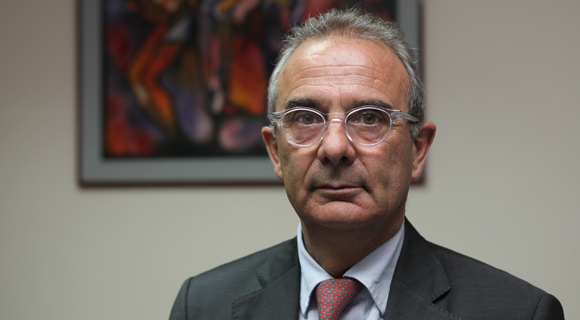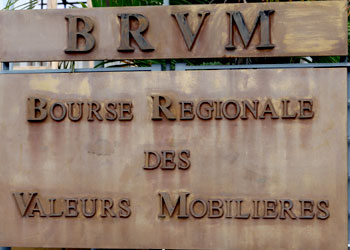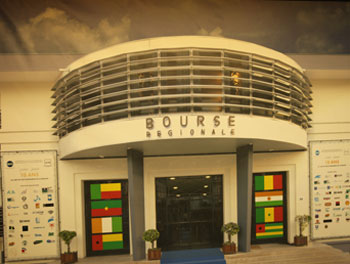Bourse Régionale des Valeurs Mobilières
Jean Paul Gillet, General Manager of the BRVM (Bourse Régionale des Valeurs Mobilières)
The Bourse Régionale des Valeurs Mobilières (BRVM) covers eight countries of the UEMOA Union. The Bourse Régionale des Valeurs Mobilières is a young entity established in 1996. Up to now, the Bourse Régionale des Valeurs Mobilières has successfully positioned itself as an exchange that “has its word” in the African continent.
Interview with Jean Paul Gillet, General Manager of the BRVM (Bourse Régionale des Valeurs Mobilières)

From the beginning of the year to now, Nairobi Stock Exchange declined 16,04%, Bourse Régionale des Valeurs Mobilières 4,98% and Nigerian Stock Exchange by 5,5%. What is your evaluation of the different stock exchanges at the regional level, and what are your predictions for the year 2011?
The Bourse Régionale des Valeurs Mobilières covers eight countries of the UEMOA (West African Economic and Monetary Union). In Côte d’Ivoire, 2011 was marked by events that seriously affected the economic activities for at least six months, if not longer. Despite all these events that are not necessarily going in the right direction at present, the exchange market has only declined by about 5%. This is important because it shows the resilience of economic activities in the area and the confidence on the part of investors in the business potential of the region. So the past year will not have been a good one in terms of performance, but this performance must be put in perspective with other markets which have declined more dramatically.
You said: “The years 2009 and 2008 had seen losses of 14% and 10%, respectively, largely owing to the impact of the global financial crisis on West African economies”. What are the prospects for 2011 and 2012?
The outlook for 2011, if we remain at a decline of around 5″ to 10%, will already have had a good performance compared to the other markets as a whole. We hope to do even better than this. Why not gain some stability, because we foresee a recovery in the future. This recovery will perhaps not arrive by the end of 2011, but it will be especially notable in 2012. Therefore, the prospects for 2011 are, in our opinion, not very interesting. It is better to look beyond to 2012 or 2013.
How does the business community perceive the Bourse Régionale des Valeurs Mobilières as a way to raise financing?

The Bourse Régionale is a young entity, since it was created in law in 1996. Its activity started in 1998 and has undergone crises since that period. It has yet to truly demonstrate its ability to provide all its services and, in particular, to help as much as its developers would have liked to finance businesses and permit them to raise capital.
Nevertheless, it has been a fairly perilous enterprise, since it is still the only exchange that truly functions at the regional level across eight countries. We can say that despite all these context difficulties, the Bourse Régionale has successfully established itself as an exchange that matters in the African continent.
We met two Ivorian companies, Pétro Ivoire and SIMAT, that have had themselves listed on the EURONEXT in Paris.
They are not at all counterexamples. Here we enter into slightly more technical considerations that make it, for the moment and for often regulatory reasons, easier for these companies to list themselves and operate as they wish in Paris rather than on the BRVM. I think that it is part of the growing pains of the markets that have not yet reached full maturity in terms of function and regulation.
Because you are based in eight or nine countries, who regulates the exchange? What must you do to facilitate your operations?
It is this characteristic that bears in itself advantages and disadvantages. We have grown to a regional level, and regional institutions do not necessarily always work as quickly and as well as national institutions. And we have the same problem at the level of the regional financial market. The problem of our youth is that eight countries do not make one country. Eight countries are more a sum of eight difficulties rather than a merger of a complete set. So when there are decisions to make, it is always somewhat complicated.
How do you see the progress for an integrated union of ECOWAS?
At the level of the UEMOA, I think we all look at what is happening at the level of the European Union and what is happening with respect to a crisis like that of the Greek debt. At the level of unions, we must be able to move beyond the stage of simple institutions to truly attain decisional powers of at a regional level, not by a sum of countries.
Besides, I think that at the level of the founding texts, there are a certain number of regional parliaments, etc. that we anticipate that do not exist at the moment. These should allow us to eventually have much more common economic policies and thus, to have a simplification and greater coherence and make the most of this whole of eight countries rather than of each of these small countries.
It is not international aid that has developed any country in the world; it is always the private sector that has really allowed countries to take off economically.
What additional services do you want to develop or do you actually intend to develop to make this market more sophisticated?
This is a real debate, because we can ask questions about the sophistication of markets. We see what becomes of this sophistication when it is pushed to the extreme. I think the truth is in between, and we should not be too rustic, but we also do not necessarily want to be hyper-sophisticated to the point of not knowing what it is about.
I would say that for us, the first step would be to have a little more diversity in the case of our base, just to get out of securities and to have some convertible bonds; for example, before moving toward more sophisticated products in terms of market coverage.
The other axis centers upon interest-rate products. Here too, there is an enormous way to go, because the CFA franc money rate has interest rates that are totally disconnected from those of the euro. And much could be done on the aspect of interest with respect to products of interest-rate instruments.
You said that you have developed the market for SMB’s. How will you encourage them?
One of the characteristics of the private sector in West Africa is the abundance of small businesses and the relatively small number of large companies. So if the financial market must facilitate the raising capital for companies, it must also target small and medium businesses, not only large groups. That is where there is some difficulty, because the regulation of financial markets is very often designed for large businesses.
Companies must learn to formalize themselves, to better communicate, and business leaders must incorporate this axis into their strategies. But markets, regulations, the authorities of such and the exchange in particular must allow these companies to come more easily into the market, with better cost terms and simplified regulatory conditions.
Apart from regulation, what are your major challenges? Is it perhaps market liquidity?
A market, by nature, necessarily has liquidity limits. Obviously, a small market has liquidity limits that are reached much more quickly than they are in large markets. We have a first problem that is also related to the regulation of the nominal value of securities. Our shares are very expensive. We are working on an amendment to this regulation. Once that is achieved, we can then multiply the number of shares on the market and thus facilitate the exchange.

Companies in particular must also agree to put more shares on the market. Today, the minimum limit is 20%. There are only very few companies that go beyond this percentage. So the more shares of a company there are in the market, the greater the liquidity of that security is.
Why do you believe there is this limit of 20% in general?
The principle of French speakers, in general and of the region, is that we are of a rather farming culture; we are not shopkeepers or industrialists by nature. And a farmer likes to possess; he does not like to share. Another approach might be that of renting one’s fields when one does not cultivate them. You will not find many farmers in France who lease their land for a season or two to have it cultured.
Business owners have the same reaction. They do not like to share, and when they are told that they must open up their capital, they see people come whom they do not know, and they are afraid of losing control of their business. So there is a whole cultural education to promote.
It is a whole process of education that has to pass throughout the whole region.
Absolutely. The market economy, capitalism and the division of capital are not necessarily things very deeply embedded in the culture of developing countries. Fortunately, with the elevation of the level of education of new entrepreneurs, new habits will fall into place.
How do you think you can attract international investors? Is it a good time to invest now?
I think the time has never been better to attract international investors, even if, seen from the other end of the world, Africa is still a little scary because one often associates with it the term “Black Africa”. But I think that prejudice is quickly dispelled when people establish contact with people from Africa and realize that it is actually a continent that is exploding. In view of the growth figures in the various areas today, with growth rates between 5 and 8%, Africa is at the top of the leader-board.
It is also necessary for the stock exchanges, the markets and the business environment to promote confidence so that these funds can come develop the economies of African countries. It is not international aid that has developed any country in the world; it is always the private sector that has really allowed countries to take off economically.
Is it difficult now to list a business on the stock market? Is it difficult for foreigners to invest?
Listing a company on the BRVM is no more difficult than on another market. It is true that we want to play in the big leagues of the financial markets and of investors, and address the entire planet. The rules that we apply must also be understood by Western countries and be comparable to theirs. So companies must make efforts for transparency and communication to be credible to investors and to build their confidence. As a market, technically, we have capabilities that are entirely credible. It takes willingness on the part of both businesses and public authorities to incite and truly build confidence and make these new funding mechanisms credible.
For a foreign investor, there are no constraints. For non-residents, investments and repatriations are free. In the market, there are no constraints.
How is this done? Are there companies that offer brokerage services?
Absolutely. There are 25 management and inter-mediation companies in the area. We have the same structure as the French market since the law is inspired by French law. So foreign investors must not fear placing euro in our market.
The vision of the BRVM for the future, if one projects this by 20 years, has several axes. There is an ECOWAS region axis to form a more global group. That is the geographical axis. There is a second axis that is slightly transverse too, which will perhaps be set up before: the CFA franc axis. And in relation to these two areas, there are now barriers that could easily be lifted. We could consider cross-listings of companies from one area to another.
Now, at the level of economic development, the continent will certainly grow in years to come. What place will West Africa take? I think it has strengths recognized by everyone. We are in tropical areas; agriculture is a sector that can grow tremendously. We are in a sub-tropical area in which we can use the sun significantly in terms of energy. There are also significant mining resources in many countries. Today, there is no real consumer market, but tomorrow, there will be. I think it is one of the triggers that will allow many industrialists to offer products to these consumers.
Is it mostly local investors or international investors that invest in the stock exchange?
Today, in terms of the types of investors, approximately between 15% and 25% of market investors are foreign. So it is not an extremely important figure, but it is not negligible either. Our limits today are not so much money or investors as they are the lack of businesses to put on the market to offer these opportunities to investors. I think that after the crisis which we are experiencing, the return of international investors will be even more significant than after the last two crises.